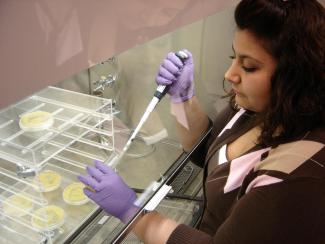
Congratulations to Dr. Munira Lantz on the successful
completion of her PhD Thesis Defense
“Impacts of environmental change on freshwater nitrite oxidation”
Microbial communities play an important role in determining the fragility or resilience of freshwater ecosystems facing environmental challenges. Nitrogen cycling microbes, for instance, can remove nitrogen pollution in contaminated systems, but removal rates are dictated in part by response to physicochemical parameters in the system. Here, we characterized the ecophysiology of a novel nitrite-oxidizing bacteria (NOB, which metabolize nitrite to nitrate) from the Candidatus Nitrotoga genus in order to determine growth limits and response to environmental change. Ca. Nitrotoga sp. CP45 (previously enriched from the South Platte River system, Colorado) oxidized nitrite at temperatures ranging from 4-28˚C, with maximum rates at 25˚C. Nitrite oxidation occurred at pH 5-8, but the upper and lower pH limits were not reached within the conditions tested. Rates were slowed significantly in the presence of light, likely due to photoinhibition. The addition of organic carbon in the form of acetate and dextrose significantly elevated rates, while formate halted nitrite oxidation activity. Exposure to antibiotics commonly found within the river resulted in elevated nitrite oxidation rates (5-500 nM erythromycin, sulfamethoxazole, and trimethoprim, which is up to ~1,000-fold higher than in situ river concentrations). Mesocosm experiments showed that endogenous riverine sediment communities were also able to maintain nitrite oxidation throughout exposure to elevated antibiotic concentrations. Overall, these results suggest that freshwater NOB are resilient and are able to maintain nitrogen cycling—a critical ecosystem service—in the face of a variety of environmental pressures. Understanding the versatility and environmental limits of NOB is important for identifying the specific conditions that maximize nitrogen removal, which may ultimately direct future management decisions aimed at restoring anthropogenically impacted systems.
In addition to obtaining her PhD, Munira also won the American Society Microbe (ASM) Minority Travel Award to present her work at the national ASM conference this summer as well as a Rocky Mountain Society of Environmental Toxicology and Chemistry (RMSETAC) poster award on April 26, 2019.
